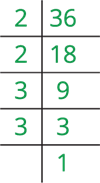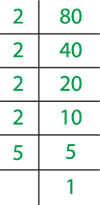UPSKILL MATH PLUS
Learn Mathematics through our AI based learning portal with the support of our Academic Experts!
Learn moreTo check whether the given natural number is a perfect square or not, we can follow the below steps:
Step 1. Write the given natural number as a product of prime factors.
Step 2. Now, group the factors in pairs so that both factors in each pair are equal.
Step 3. Now, see whether some factors are leftover or not. If no factor is leftover in grouping, then the given number is a perfect square. Otherwise, it is not a perfect square.
Step 4. Take one factor from each group and multiply them to obtain the number whose square is the given number.
Let's see an example to understand this concept clear.
Example:
Check whether 36 is a perfect square or not. If it is perfect square, find the number whose square is 36.
Solution:
The given number is 36.
We have to write 36 as a product of prime factors.

36 = 2 \times 2 \times 3 \times 3
Now, group the prime factors of 36.
Here, no factor is leftover in grouping.
So, the given number is a perfect square.
Now, we need to find the number whose square is 36.
Take one factor from each group and multiply them to obtain the number whose square is the given number.
Therefore, 36 is the square of the number 6.
To obtain perfect square:
All numbers are not perfect squares. If any number is not a perfect square, we need to multiply or divide the given number by one of the factor(s) to make it a perfect square.
Example:
Is 80 is a perfect square? If not, make it a perfect square.
Solution:

80 = 2 \times 2 \times 2 \times 2 \times 5
80 = (2 \times 2) \times (2 \times 2) \times 5
Here, 5 is leftover in grouping.
So, 80 is not a perfect square.
To make 80 as a perfect square:
Case I: The number leftover in grouping is 5. So multiply the given number by 5.
80 \times 5 = 400
Therefore, 400 is a perfect square.
Case II: The number leftover in grouping is 5. So divide the given number by 5.
Therefore, 16 is a perfect square.
Important!
A perfect number cannot be a perfect square number. Perfect numbers such as 6, 28, 496, 8128,... are not square numbers.